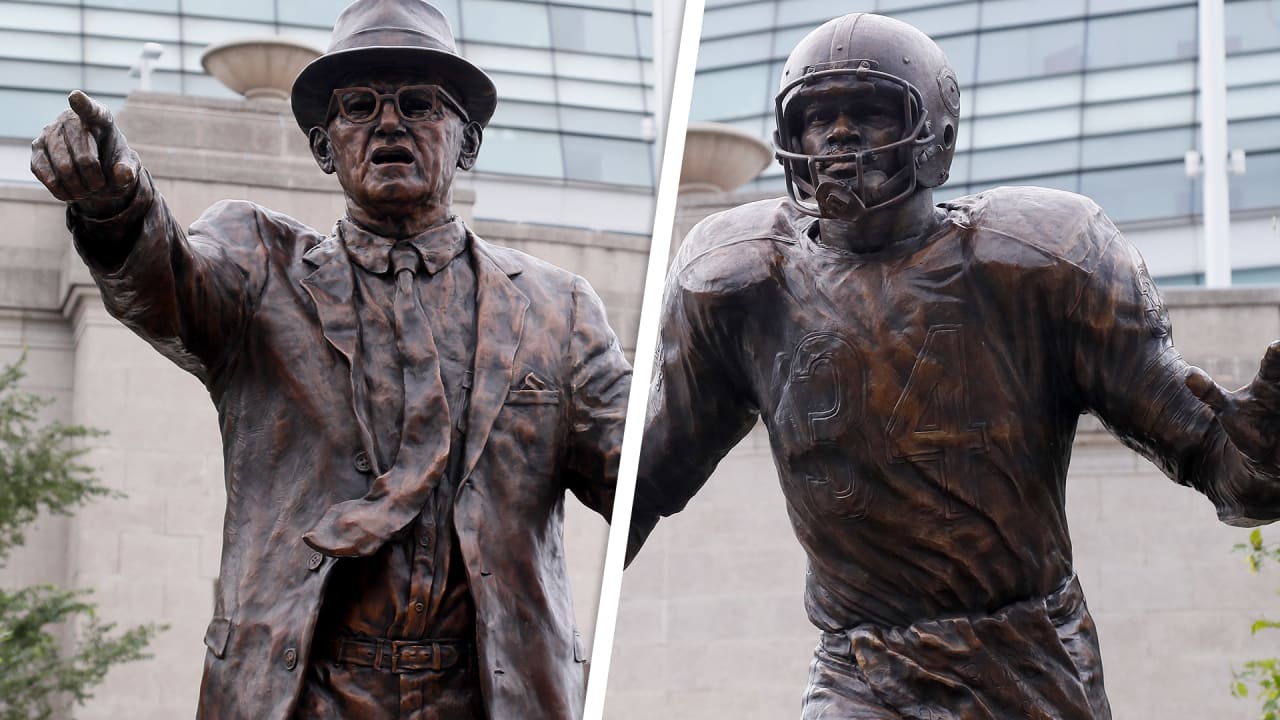Staley Da Bear
Well-known member
- Mar 16, 2019
- 2,085
- 0

“At the risk of being overly obvious,” Hampton said, “it is only fitting that these two most colossal of all figures in a long line of gigantic characters of the Chicago Bears will forever be immortalized—to symbolize the greatness of the Chicago Bears or more importantly to symbolize what the Bears mean to Bears fans not only here in Chicago but across the nation.”
The McCaskey family was well-represented at the ceremony, led by Bears chairman George H. McCaskey. Others in attendance were team president/CEO Ted Phillips, Payton’s widow, Connie, and Payton’s running backs coach with the Bears, Johnny Roland. Payton’s former Bears teammates on hand included Brian Baschnagel, Kurt Becker, Jimbo Covert, Roland Harper, Dennis McKinnon, Steve McMichael, Jim Osborne, Matt Suhey and Otis Wilson.
A Chicago native who starred at the University of Illinois, Halas was a pro football pioneer. He founded the Bears as the Decatur Staleys in 1920 and helped create what would become the NFL when he joined representatives from 10 other teams in Canton, Ohio, in September 1920 to found the American Professional Football Association.
Halas moved the Staleys to Chicago in 1921 and they were renamed the Chicago Bears in 1922. “Papa Bear” was instrumental in the growth of the fledgling league, helping it eventually become a multi-billion dollar industry and staple of American culture.
As a player, Halas was named to the NFL’s 1920s All-Decade Team. His 98-yard return of a Jim Thorpe fumble remained an NFL record for 49 years until it was broken in 1972.
Serving as Bears coach for four separate 10-year stints, Halas led the franchise to six NFL championships in 1921, 1933, 1940, 1941, 1946 and 1963. He ultimately became the winningest coach in NFL history with 324 victories, a record since surpassed by Don Shula.
“The story of George Halas is not only unbelievable as the player, the coach and the creator of the NFL and the Chicago Bears,” Hampton said, “but think of the millions of lives that his passion has touched and changed in the last 100 years. It’s incomprehensible.”
Hampton told a story about how deeply the Bears were affected when hearing that Halas had passed away on Oct. 31, 1983 at the age of 88.
“I’ll never forget the look of resolve and dedication in coach Ditka’s face,” Hampton said. “The rest of us, we all had a promise that we made to ourselves that we would be part of destiny, that we would win another championship.”
The Bears did just that in 1985, capping an unforgettable season by pummeling the Patriots 46-10 in Super Bowl XX. Payton was the star running back on that team, but he had emerged as the face of the franchise long before the Bears hoisted the championship trophy.
The fourth pick in the 1975 draft, Payton spent his entire 13-year NFL career with the Bears, missing only one game and retiring following the 1987 season as the league’s all-time leading rusher with 16,726 yards. He was inducted into the Hall of Fame in 1993 in his first year of eligibility.
“I played with Sweetness for nine years,” Hampton said. “Every single day—and every one of the players that are here today and coach Ditka will tell you the same thing—Walter proved why he was not only the greatest player on the greatest team of all time, but he was exemplary in all walks of life.”
Ditka first discovered Payton when “Da Coach” was working as an assistant on Tom Landry’s staff with the Cowboys. Studying game film in preparation for a contest against the Bears, Ditka couldn’t believe what he was seeing.
“I turned it on and watched something that I had never seen,” Ditka said. “I watched No. 34, the most amazing football player I ever saw. It was the most unbelievable thing I’ve ever seen, not because of the talent—the talent was there—because of the heart. He wanted to be, he willed to be and he was the absolute best I’ve ever seen.”
Payton was voted to nine Pro Bowls, set 16 NFL records and 27 Bears marks and had his No. 34 retired. He also threw eight touchdown passes and led the NFL in kickoff returns as a rookie in 1975 with a 31.7-yard average. In 1999, the NFL renamed its Man of the Year award after Payton as a tribute to his greatness both on and off the field. The Bears legend passed away on Nov. 1, 1999 at the age of 45 due to bile duct cancer.
“We know that dad is definitely smiling down on all of us,” Brittney said at Tuesday’s ceremony. “Over the past few weeks we’ve had the chance to really reflect on our father and his legacy. We remember his humility, his work ethic and a smile that we all know could light up a room. Our father always played his heart out each and every game, and he did it for his fans. He would be so proud of this moment and moved we know beyond words.”
